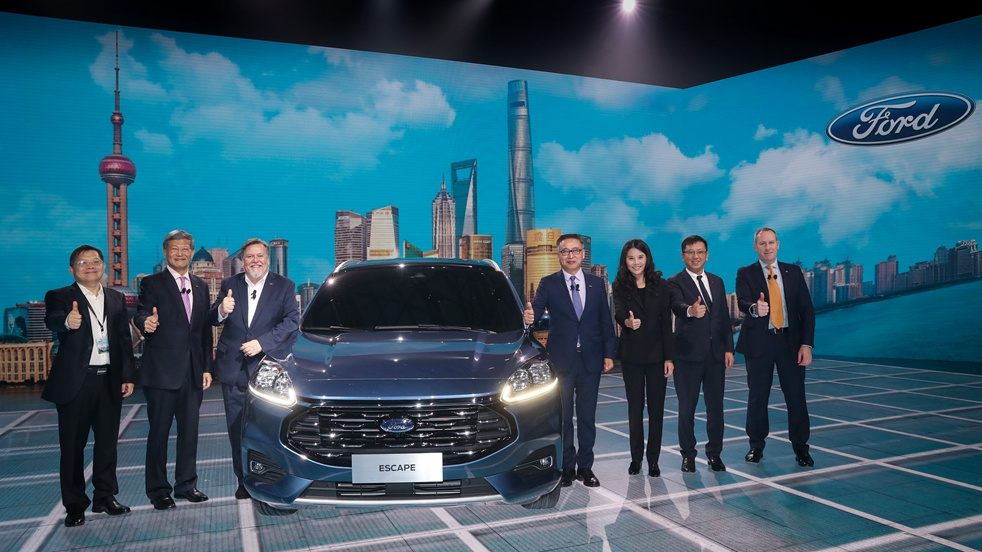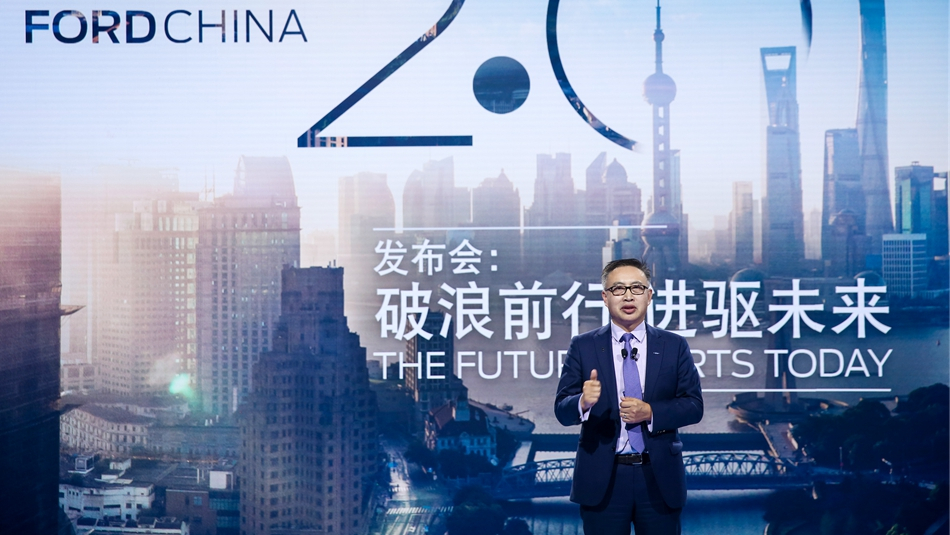
Company
20:58, 04-Apr-2019
Ford cautiously optimistic on China's auto market in 2019
Updated
14:52, 08-Apr-2019
Zhang Xinyuan

Ford is cautiously optimistic about China's economy in 2019. However, with the company's relatively low market share in the country, China still presents a huge opportunity for the second largest U.S. carmaker, according to Chen Anning, the new chief for Ford's China operation.
"The auto industry is deeply connected to the macroeconomy, so as China's economy bounces back gradually, the auto market will rebound accordingly," said Chen at the sidelines of the company's "Ford China 2.0" strategy announcement held in Shanghai on Wednesday.
Prompted by the downward economic pressure and trade frictions with the U.S. in 2018, China's car sales fell for the first time, by 6 percent to 22.7 million units, according to the China Passenger Car Association (CPCA).
"The Chinese government has already launched measures to boost the economy, I believe those measures will show effects soon or after some simmering time. As the effect shows, China's auto market will recover," said Chen, Ford China's President and CEO.
Ford will closely watch the economic policies by the Chinese government and how it plays out, and adjust Ford's strategy accordingly, said Chen.
'In China' policy to revive sales slump
Chen also noted after 30 years of rapid development, China's auto market has reached micro or even zero growth periods, which could last a while.
According to the China Association of Automobile Manufacturers, the country's auto market penetration rate has reached maturity after decades of rapid growth, entering a stable development period. It also notes that one of the reasons for the sales slump last year was that purchase tax cuts in previous years overcharged the consumers' purchasing power.
Amid the sales slump trend last year, Ford also suffered a sales drop of 36.9 percent in China.
After a less-than-satisfying performance last year, the carmaker is determined to boost its sales number in China. "China has the largest consumer market in the world. The Chinese market is of great importance to Ford," Chen said.
As part of Ford operations restructure worldwide last October, its China business became a stand-alone business unit, reporting directly to global headquarters, which aims to increase the internal decision-making speed and be closer to Chinese customers.
In the strategy announcement, Ford also launched an innovation center, design center, product center, and new energy vehicles center in China, aiming to speed up products' R&D and launch, and develop cutting-edge smart technologies used in cars with its partners such as China's tech giants Baidu and Alibaba.
Ford also announced that the company will launch 30 new models in the Chinese market in the following three years, and 10 of them will be new energy vehicles.
Upbeat on China-U.S. trade prospects
The U.S. and China engaged in tit-for-tat tariff-slamming trade friction since March last year, hurting the auto industry as its industrial chains span the globe.
In a Reuters report in January, Ford's Chief Financial Officer Bob Shanks pointed out that tariffs and high commodity costs hurt its 2018 earnings.
The two countries agreed to a temporary truce since the G20 Summit in Argentina, and have been engaged in trade talks. Chen is optimistic about the talks.
"The signals from the recent China-U.S. high-level trade talks have been very positive. Ford is very glad about the recent progress," Chen said.

Chen Anning, Ford China's President and CEO, gives a speech at "Ford China 2.0" strategy announcement in Shanghai, April 3. /Photo: Ford China
Chen Anning, Ford China's President and CEO, gives a speech at "Ford China 2.0" strategy announcement in Shanghai, April 3. /Photo: Ford China
"We hope the governments will make joint efforts, and provide a fair trade environment," Chen said.
China's State Council announced last Sunday that the country would continue to suspend additional tariffs on U.S. vehicles and auto parts after April 1, in a goodwill gesture following a U.S. decision to delay tariff hikes on Chinese imports.
Pilot 5G-enabled technology in China
With China's leading role in 5G development, during the strategy announcement, Chen also stated that Ford will pilot its cellular vehicle-to-everything technology, known as C-V2X, which will run on 5G in 2021, one year ahead of the U.S. schedule.
As the first stage of 5G, C-V2X is an important step in building a full range of compatible applications and infrastructure.
"China is leading the world's smart car development; we are excited to see that more high-end technology products are designed in China and going international," said Ford's President and CEO Jim Hackett.
C-V2X will enable Ford's cars' awareness of the surrounding environment, which could improve traffic efficiency, reduce road deaths and push the auto-pilot technology development, according to Ford.
The move demonstrated the importance of the Chinese market in Ford's global deployment, Chen said.
Chen Anning is a former Ford engineer and chairman of Chery Jaguar Land Rover in China. Ford hired Chen last October and entrusted him to fix the carmaker's sales slump in the world's biggest car market.
Industrial insiders believe that getting a local person for the role is a good move, and will likely give Ford a better understanding of the market, according to a Reuters report last October.

SITEMAP
Copyright © 2018 CGTN. Beijing ICP prepared NO.16065310-3
Copyright © 2018 CGTN. Beijing ICP prepared NO.16065310-3